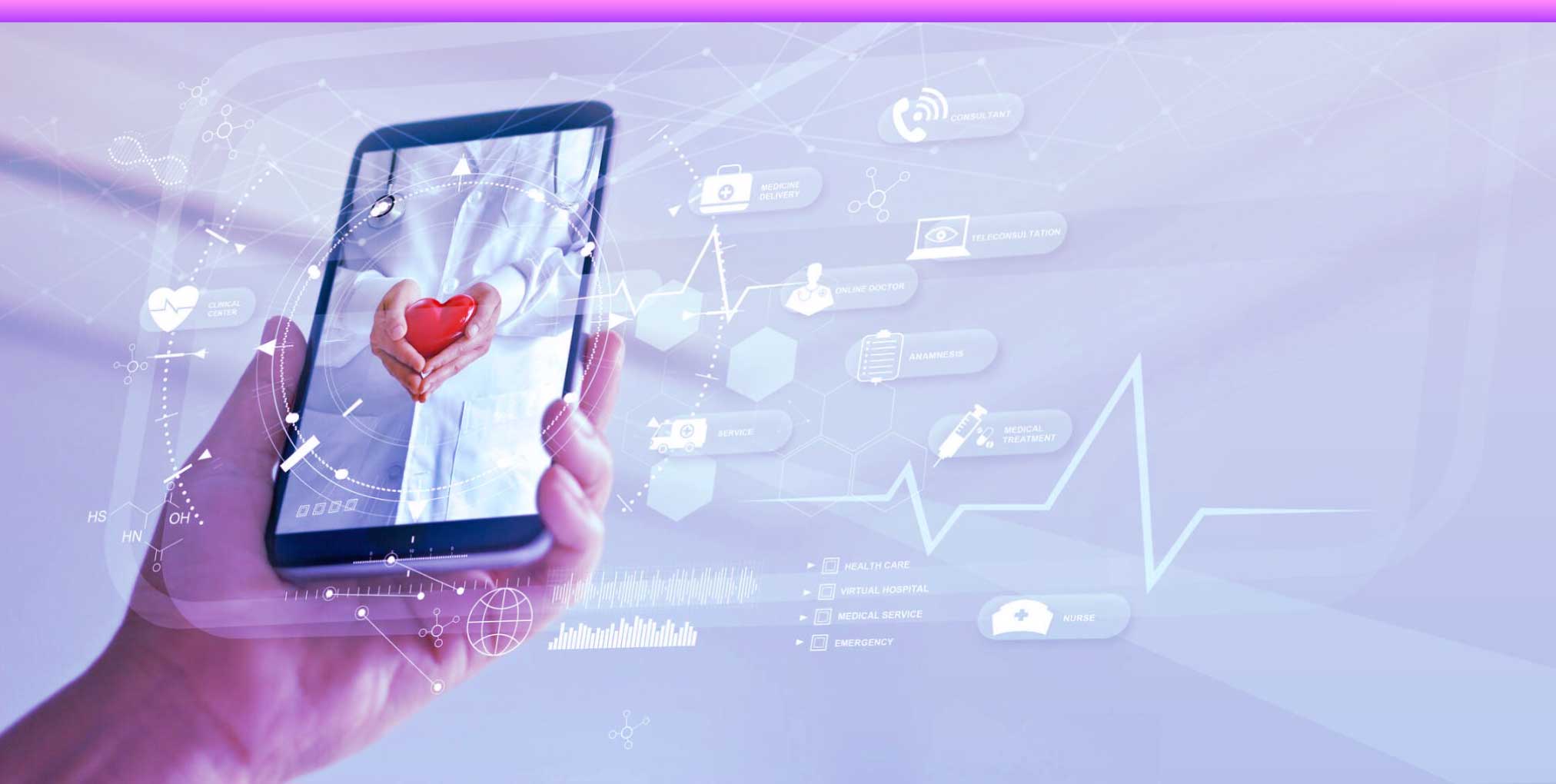

January 23, 2024
Mobile app for healthcare is an innovative solution gaining immense popularity among healthcare providers, patients, and the general public for its many benefits. The healthcare industry has undergone a massive transformation in the last decade owing to rapid advancements in technology.
One of the most significant changes in the sector has been the rise of Mobile Health (mHealth). It involves using mobile devices and wireless technology in healthcare, including mobile applications that enable patients to access healthcare remotely.
Healthcare app development has become essential for the IT ecosystem. However, the process of building a healthcare app can be challenging. In this blog post, we will guide you on how to build a healthcare app and highlight some of the essential things to keep in mind.
The global Mobile Health (mHealth) market reached $80.61 billion in 2022 and is projected to exceed $269.31 billion by 2032. It shows a compound annual growth rate (CAGR) of 12.3% during the forecast period from 2023 to 2032. In the United States, the mHealth market was valued at $18.98 billion in 2022 and is expected to grow at a CAGR of 13% from 2023 to 2032. The increasing adoption of smartphones and growing consumer demand for mHealth Apps are key drivers of revenue growth in the market.
In healthcare, there are many different apps that help with things like checking your health, making things easier for doctors, and keeping you connected with your health. These apps do a lot of different jobs to make healthcare better. Let’s look at the different types of healthcare apps and what they do.
Healthcare applications have become an essential part of our lives. With an ever-growing market, these apps cater to a variety of needs. Five types of healthcare applications highly used by patients include:
Enable patients to consult with healthcare professionals remotely via video or audio calls.
Medication reminder apps help patients adhere to prescribed medication schedules.
![]()
These apps allow users to monitor their overall health by tracking parameters such as daily steps, heart rate, sleep patterns, and nutrition.
Patients with chronic conditions like diabetes or hypertension can benefit from apps that help them manage their needs.
Mental health apps offer tools and resources for managing stress, anxiety, depression, and other concerns.
Among these innovations, telemedicine applications are particularly noteworthy. These applications empower patients to establish connections with healthcare professionals and take charge of their well-being conveniently.
Telemedicine applications serve as a lifeline for individuals residing in remote regions where physical hospitals are scarce or for patients with disabilities. These applications provide a range of communication options, including video calls, audio calls, and text-based chats, enhancing accessibility to healthcare services. With the rise in popularity of such apps in healthcare, the future seems brighter and more accessible for the masses.

Healthcare applications have been on the rise, especially for doctors. These apps are designed to help doctors manage their workload by providing quick access to vital information. It enables them to perform their duties more efficiently. They are helpful in various areas, including diagnosis, treatment, and communication.
Apps for healthcare capitalize on providing doctors with real-time assistance and updates with the latest medical advancements. Integrating these apps into daily work-life has transformed the healthcare system with less paperwork and more productivity.
Healthcare providers like hospitals and clinics rely heavily on technology to improve patient care. With the help of healthcare applications, they achieve faster and more efficient diagnosis and treatment plans.
Machine learning technology enables healthcare providers to make data-driven decisions that lead to accurate diagnoses. Medical team management apps help these institutions manage their workforce more effectively.
The scheduling aspect of hospital management can become tricky due to long shifts and emergencies. A management solution comes in handy, simplifying the scheduling process for managers.
Finally, electronic health records have become a norm in the healthcare sector, and their adoption continues to deliver better results. Mobile app for healthcare are revolutionizing the industry, and healthcare providers must embrace them to transform patient outcomes.
Exploring the niche of health apps designed for patients opens up a spectrum of advantages that cater to enhanced healthcare experiences. No we will explore the various benefits associated with the development of health apps specifically to meet the needs and preferences of patients.
Mobile apps for healthcare are fast becoming a preferred tool for patients looking for easy and cost-effective ways to access healthcare services. One of the top benefits of building a health app for patients is improved accessibility to healthcare. Patients need not wait in long queues or travel long distances to see their doctors. Patients can schedule appointments, get consultations, and even deliver their prescriptions with just a few clicks.
In addition, healthcare apps provide users with up-to-date information on health and wellness, which means patients can take proactive measures to safeguard their health. The improved accessibility assures patients that their health needs are always within easy reach.
One major advantage is the efficient appointment management enabled by various features such as:
This simplifies the administrative tasks for patients and minimizes the chances of missed appointments or medication doses. With these benefits, a health app is a vital tool that enables patients to take an active role in their health management.
Improved medication adherence is one of the key advantages of app for healthcare. They provide patients with reminders, tracking features, and other tools to help them stay on their medication schedules. This leads to better outcomes, more successful treatments, and increased patient satisfaction in their own healthcare.
Overall, investing in a health app for patients is a smart move, with many benefits that can help both patients and healthcare providers.

One of the top advantages of health apps is remote consultations and telemedicine. With the help of video calls or messaging, patients can easily consult with healthcare providers from the comfort of their own homes. This is highly beneficial for those who require follow-up appointments, mental health support, or advice without making in-person visits.
Building a health app for patients has many benefits, but cost reduction is the most appealing. By utilizing technology, healthcare providers can streamline services for patients, ultimately reducing the overall expenses associated with healthcare. This cost reduction benefits patients and healthcare providers, who can focus on more complex cases and ultimately provide higher-quality care. By building a health app, providers can create a more accessible and affordable healthcare experience.
Developing health apps for doctors brings forth a range of advantages, streamlining their work and enhancing patient care. These applications offer tools and features that simplify tasks and contribute to overall efficiency in medical practices. Let’s explore the benefits associated with building health apps specifically designed to meet the needs of doctors.
Building a health app for doctors can be a game-changer as it provides efficient patient management. Doctors can access patient records, appointment schedules, and medical information quickly and securely. It can also eliminate the need for paperwork, saving time and reducing the risk of errors. With an intuitive user interface, doctors can efficiently manage patient information, track progress, and provide the best care possible.
The benefits of a mobile app for healthcare don’t end here. Doctors can also receive notifications and alerts, reducing the chances of missed appointments, and keeping the workflow consistent and hassle-free. Building a health app for doctors can help streamline the medical practice by providing efficient patient management.
Enhanced communication is one of the most significant advantages of building a health app for doctors. With secure messaging and video conferencing capabilities, healthcare professionals can consult with patients, coordinate care with colleagues, and manage administrative tasks with ease. This efficient communication saves time and enhances the overall quality of care, ultimately benefiting both doctors and patients.
With notifications, patients can manage their appointments efficiently, reducing the instances of missed appointments and saving doctors time and money. By eliminating a big chunk of administrative work, doctors can focus on providing the best possible care to their patients. Another added advantage is the significant reduction in operational costs. Building an app in healthcare is a great investment that can help improve their patients’ experience.
Health apps are revolutionizing the way doctors access and utilize medical resources. By developing customized apps for physicians, healthcare professionals can benefit from an extensive collection of:
This wealth of information enables doctors to make informed decisions, ensuring patients receive the best care.
With the convenience of having access to the latest medical research, healthcare professionals can provide more accurate diagnoses and treatment plans while saving time and effort. Consequently, building a health app is an efficient way to improve healthcare delivery and provide better patient outcomes.
In today’s digital age, health apps are quickly becoming a go-to solution for doctors seeking more efficient and effective ways of managing their patients’ health. One of the top benefits of building a health app for doctors is its remote monitoring capabilities.
With these apps, doctors can keep track of vital signs, chronic conditions, and recovery progress, making post-operative care and chronic disease management easier. This is a game-changer for doctors with patients in remote locations or who have trouble making appointments due to mobility issues.
Developing a mobile app for healthcare is an exciting journey, but it’s a process that requires careful consideration and planning. The first step to take is to conduct a market analysis. This will help you identify your niche and investigate the market to learn about trends, target audiences, and technologies.
Knowing what your competitors are doing and who they’re targeting will enable you to create a strategy that sets you apart. A SWOT analysis will also help you detect your strengths and opportunities to exploit them in the market. A thorough market analysis gives you a clear idea of what you’re getting into, what resources you need, and the potential rewards.
One crucial step in developing a healthcare app is studying your audience. This involves conducting surveys and creating personas to gain a deeper understanding of your target users and their pain points. To create a successful product, it is essential to solve a specific user problem and do it better than your competitors.
By taking the time to understand your audience, you can design an app that meets their unique needs and offers solutions that they will find valuable. This step is important for ensuring that your healthcare app stands out in a crowded market and truly makes a difference.
As you continue your journey towards developing an app for healthcare, it’s time to choose the type of app you want to create. There are several types to choose from, including appointment scheduling, fitness tracking, telemedicine, and health monitoring apps. Each has its own benefits and drawbacks, so it’s crucial to carefully consider your goals and target audience before making a decision.
For example, an appointment scheduling app would be ideal for a medical practice looking to streamline its scheduling process. On the other hand, a telemedicine app would be better suited for healthcare providers looking to offer virtual consultations to patients.
However, keep in mind that to stand out from the competition, you need to find characteristics that make your app unique. By selecting an app type that fulfills a particular need within the healthcare industry, you’re well on your way to creating a successful healthcare app.
Once all the necessary groundwork has been completed, it’s time to create an intuitive design for your healthcare app. A well-designed app can lead to better user experience, engagement, and even more downloads.
To create an adequate design, start by establishing a clear visual identity that aligns with your brand guidelines. This will ensure consistency across your app and instill trust in your users. Then, consider the user journey and aim to create a seamless flow from start to finish, keeping in mind the purpose and functionality of your app.
Always prioritize simplicity and user-centered design, and don’t be afraid to gather feedback and iterate as needed. Remember, a thoughtfully designed healthcare app can positively impact your users’ health outcomes and overall well-being.

Developing a mobile app for healthcare is a complex task. Ensuring HIPAA compliance is the fifth and most important step in the process. This step is particularly important because it protects the privacy of healthcare information, a top priority for patients and healthcare providers alike.
As developers work on the app, they must ensure that it meets all the requirements set forth by HIPAA regulations. This means the app must have appropriate security measures in place, including encryption and access controls. The app must also be capable of securely collecting and transmitting patient data.
To achieve this level of compliance seamlessly, consider partnering with the best app developer company like Xeven Solutions. With their expertise and experience, you can be confident in your app’s ability to safeguard patient information and adhere to HIPAA standards.
By taking the time and effort to ensure HIPAA compliance, developers can create a healthcare app that is both effective and trustworthy.
After completing initial phases like market research and defining the app’s objectives, it’s now time to build your MVP. This stage requires a clear list of essential features that will be part of the basic functionality.
Your MVP should provide a solution for the main issue of the healthcare industry it aims to solve. It could enable sharing patients’ clinical records or allow healthcare providers to make appointments online.
Start with the most basic functions first; from here, you can expand to more advanced features later. Keep in mind that an MVP is a critical phase for testing the market and engaging potential users. By providing a basic level of functionality, you can collect useful feedback to improve your app for further iterations.
After putting in work to design and develop a healthcare app, it’s essential to test its effectiveness with A/B testing. This process will help you determine which aspects of your app are most successful, and which need improvement. By randomly splitting patients into two groups, you’ll be able to compare how well two versions of the app perform.
Collecting feedback from patients will also be incredibly useful during this stage. This can give you insights into what patients like (and don’t like) about your app and what features they might want to see in future updates. Ultimately, A/B testing and feedback collection can help you refine your app and deliver the best possible experience to patients.
After the development and launch of a healthcare app, ongoing maintenance and support are crucial to ensure the app’s continued success. The app must be regularly updated to address bugs and glitches that may occur or to introduce new functionalities to keep users engaged.
Besides, ensuring the app remains compliant with relevant regulations is also critical. Technical issues will arise, and users will have questions that require timely and satisfactory answers.
Regularly monitoring user feedback and providing support through various channels can lead to higher user satisfaction and the potential for new users. Thus, ongoing maintenance and support are integral parts of developing a healthcare app.
In conclusion, building a healthcare app requires careful planning and execution. Several healthcare app builders are available to assist in the process. The key to success lies in understanding the needs of the users, complying with relevant regulations, and leveraging emerging technologies that can enhance the patient experience.
With the right approach, a healthcare app can improve patient outcomes and contribute to the healthcare industry as a whole. Whether you are a developer or a healthcare provider, keeping up with the latest trends and best practices is vital to delivering high-quality healthcare apps.